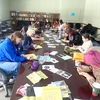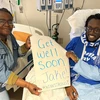It was a desperate situation and Michael C. Rockefeller had decided to take drastic measures. During an expedition to New Guinea in search of primitive artwork, the catamaran that Rockefeller and his companions were traveling in had capsized in rough waters. Two native guides immediately swam to shore for help ̶ but nearly a day had passed and none had come.
Mr. Rockefeller thus decided he would swim the 12 miles to shore with the help of a life preserver he fashioned from two empty gas tins tied together with his belt. While help eventually arrived and his companion was rescued from the overturned vessel, Rockefeller was never seen again. That was in November 1961.
For more than 50 years, Rockefeller’s fate remained a mystery. His body was never found and official reports stated he had drowned. That claim was challenged in 2014, when noted journalist and author Carl Hoffman released his book, “Savage Harvest A Tale of Cannibals, Colonialism and Michael Rockefeller’s Tragic Quest for Primitive Art.”
As part of the celebration of its 50th Anniversary Season, the Michael C. Rockefeller Arts Center will present a free lecture with Hoffman entitled “Mystery Solved: The Disappearance of Michael C. Rockefeller” on Thursday, Nov. 21 at 5 p.m. in Marvel Theatre.
The event is co-sponsored by the Daniel A. Reed Library and the Department of Sociocultural and Justice Sciences with support from the Carnahan Jackson Fund for the Humanities of the Fredonia College Foundation.
While the event is free, tickets are required. They are available through the Fredonia Ticket Office in the Williams Center, by phone at 716-673-3501 or online. There is a $6 service fee for phone and online sales.
Background
Mr. Rockefeller was the youngest son of Nelson Aldrich and Mary Todhunter Clark Rockefeller. His grandmother, Abby Aldrich Rockefeller, was a founder of the Museum of Modern Art and his father founded the Museum of Primitive Art, now part of the Metropolitan Museum of Art, in New York City and went on to be elected governor of New York State.
In March 1961, less than a year out of Harvard University, Michael Rockefeller traveled to New Guinea, which was then still a Dutch colony, as the soundman and still photographer on an expedition for Harvard’s Peabody Museum of Archaeology and Ethnology.
It was during this expedition that Rockefeller became intrigued with the possibility of collecting art from the Asmat tribe, one of the last surviving Stone Age cultures. Rockefeller and a friend returned to New Guinea in late September of 1961 with a goal of collecting Asmat art for the Museum of Primitive Art, of which he was a trustee. For nearly two months, they visited native villages along the coast and up the rivers. The expedition came to a tragic conclusion on Nov.18, 1961, when the catamaran overturned.
When the new arts center on the Fredonia campus was unveiled in 1969, the decision was made to name the building in memory of Michael C. Rockefeller, based on Governor Rockefeller’s support of the SUNY system.
“My understanding from the oral history when I arrived at Fredonia in 1982 was that Nelson Rockefeller had been a true architect of the SUNY system,” said Jefferson Westwood, director of the Michael C. Rockefeller Arts Center. “He had advocated a huge infusion of cash for building projects. Since practice did not allow for buildings to be named in honor of living persons, it was decided the new arts center should be named in memory of the governor’s late son.”
Search parties, rumors and an investigation
When Michael C. Rockefeller disappeared, the Dutch government conducted what was described as an intensive search, but no trace of him was ever found. The case was closed with the designation of Rockefeller having drowned and been lost at sea. However, Hoffman noted there were reports on the Associated Press newswire that Michael Rockefeller had actually made it to shore and was killed and then eaten by the Asmat tribe, which at that time still practiced headhunting and cannibalism.
It was this information that led Hoffman to conduct his own exhaustive four-month investigation into what became of Rockefeller. He spent those months in New Guinea, traveling to the same villages by the same routes Rockefeller had used. The journalist recorded first-hand witness accounts and found extensive documentation that he contends was intentionally covered up at the time of Rockefeller’s disappearance. These efforts led to the writing of “Savage Harvest.”
The book, which was published in March 2014 and became a New York Times best seller, gives significant credence to the idea that Rockefeller did not drown, but was indeed killed and eaten by cannibals. Hoffman will discuss his finding during the Nov. 21 lecture, which will include a question and answer session.
“Savage Harvest” was named one of the Washington Post’s 50 notable books of 2014 and was the number one non-fiction book of 2014 on Amazon.com. An excerpt from the book was published in the Smithsonian magazine and is available online.
Hoffman is also the author of “The Last Wild Men of Borneo: A True Story of Death and Treasure and The Lunatic Express: Discovering the World via Its Most Dangerous Buses, Boats, Trains, and Planes.” He is a former contributing editor to National Geographic Traveler and Wired magazines.
He is a former contributing editor to National Geographic Traveler and Wired magazines and his narrative pieces have also appeared in Smithsonian, Outside, Men’s Journal, National Geographic Adventure and many other magazines. He has traveled on assignment to 80 countries and is the father of three young adults. He lives in Washington, D.C.
A book signing with Hoffman immediately follows the lecture in the Lake Shore Savings Gateway to the Arts atrium. “Savage Harvest” is available for purchase now at the FSA Bookstore in University Commons. The book will also be available for purchase at the lecture on Nov. 21.



